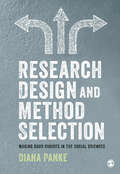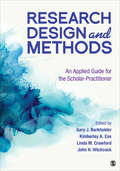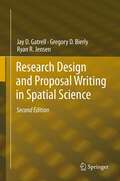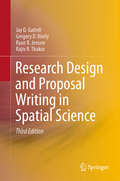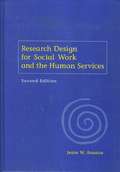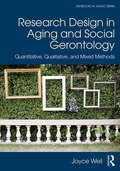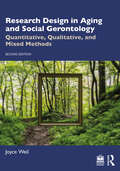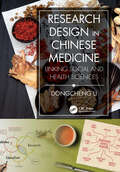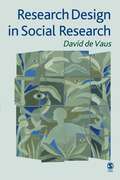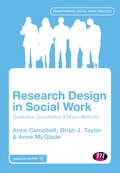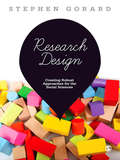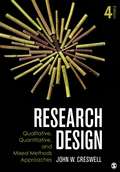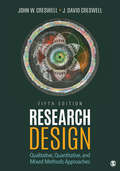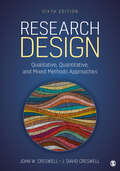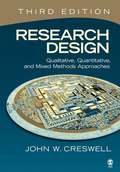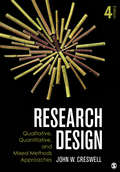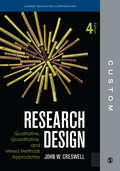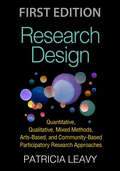- Table View
- List View
Research Design & Method Selection: Making Good Choices in the Social Sciences
by Professor Diana PankeHeavily grounded in helping students make the best choices for their projects, this book explores how to develop and work with theory, research questions, and method selection to build solid, logical proposals and move from research concepts to fully realized designs. Rather than rushing initial planning stages or reverse engineering questions from preferred methods, it encourages students to challenge unconscious biases around method selection and analysis and provides step-by-step guidance on choosing a method that is in-line with the question being explored. Focused on the role of the researcher within research design, it stresses the need to consider the theoretical underpinnings of research and not just practical issues when designing a project. It provides a sophisticated toolkit to understand: - The critical issues associated with both qualitative and quantitative methods - The approach that works best for specific research questions - How design choices can affect practice. Perfect for upper undergraduate and postgraduate students, this book will instil confidence and good decision making to ensure constructively informed design and practice.
Research Design and Methods: An Applied Guide for the Scholar-Practitioner (Mixed Methods Research Ser. #2)
by John H. Hitchcock Gary J. Burkholder Kimberley A. Cox Linda M. CrawfordResearch Design and Methods: An Applied Guide for the Scholar-Practitioner is written for students seeking advanced degrees who want to use evidence-based research to support their practice. This practical and accessible text addresses the foundational concepts of research design and methods; provides a more detailed exploration of designs and approaches popular with graduate students in applied disciplines; covers qualitative, quantitative, and mixed-methods designs; discusses ethical considerations and quality in research; and provides guidance on writing a research proposal.
Research Design and Methods: An Applied Guide for the Scholar-Practitioner (Mixed Methods Research Ser. #2)
by John H. Hitchcock Gary J. Burkholder Kimberley A. Cox Linda M. CrawfordResearch Design and Methods: An Applied Guide for the Scholar-Practitioner is written for students seeking advanced degrees who want to use evidence-based research to support their practice. This practical and accessible text addresses the foundational concepts of research design and methods; provides a more detailed exploration of designs and approaches popular with graduate students in applied disciplines; covers qualitative, quantitative, and mixed-methods designs; discusses ethical considerations and quality in research; and provides guidance on writing a research proposal.
Research Design and Proposal Writing in Spatial Science: Second Edition
by Gregory D. Bierly Ryan R. Jensen Jay D. GatrellThe complex interactions between human and physical systems confronting social scientists and policymakers pose unique conceptual, methodological, and practical complications when 'doing research'. Graduate students in a broad range of related fields need to learn how to tackle the discipline-specific issues of space, place, and scale as they propose and perform research in the spatial sciences. This practical textbook and overview blends plenty of concrete examples of spatial research and case studies to familiarize readers with the research process as it demystifies and exemplifies how to really do it. The appendix contains both completed and in-progress proposals for MA and PhD theses and dissertations. Emphasizing research as a learning and experiential process while providing students with the encouragement and skills needed for success in proposal writing, "Research Design and Proposal Writing in Spatial Science" can serve as a textbook for graduate-level research-design courses, as well as for undergraduate-level project-based spatial science courses. Keywords: proposal writing, grant writing, research, geography, spatial science
Research Design and Proposal Writing in Spatial Science: Second Edition
by Gregory D. Bierly Ryan R. Jensen Jay D. Gatrell Rajiv R. ThakurThe investigation of the interactions between human and physical systems poses unique conceptual, methodological, and practical challenges. This book establishes a spatial science framework for policymakers, social scientists, and environmental researchers as they explore and analyze complex problems. The authors provide guidance for scientists, writers, and students across a broad range of fields on how to tackle discipline-specific issues of space, place, and scale as they propose and conduct research in the spatial sciences. This practical textbook and overview blends plenty of concrete examples of spatial research and case studies to familiarize readers with the research process, demystifying and illustrating how it is actually done. The appendix contains both completed and in-progress proposals for MA and PhD theses and dissertations, as well as successful research grants. By emphasizing research as a learning and experiential process, while providing students with the encouragement and skills needed for success in proposal writing, "Research Design and Proposal Writing in Spatial Science" can serve as a textbook for research-design or project-based courses at the upper-division undergraduate and graduate level.
Research Design for Social Work and the Human Services
by Jeane AnastasResearch Design for Social Work and the Human Services integrates a range of research techniques into a single epistemological framework and presents a balanced approach to the teaching of research methods in the "helping professions." Jeane W. Anastas begins with a discussion of the different philosophical perspectives within which social research occurs and continues with problem formulation, research design, and methodological issues influencing data collection, analysis, and dissemination. She presents both fixed (quantitative) and flexible (qualitative) methods of research, granting legitimacy, value, utility, and relevance to both styles of inquiry.Utilizing complete case studies to illustrate different methodological approaches, Research Design for Social Work and the Human Services integrates material on women and people of color, and draws attention to the ways racism, heterosexism, sexism, and classism affect the conceptualization and conduct of research. Anastas not only exposes these biases but actively addresses the experiences, needs, and concerns of clients of both genders and different races, ethnicities, sexual orientations, cultures, and classes.
Research Design in Aging and Social Gerontology: Quantitative, Qualitative, and Mixed Methods (Textbooks in Aging)
by Joyce WeilResearch Design in Aging and Social Gerontology provides a review of methodological approaches and data-collection methods commonly used with older adults in real-life settings. It addresses the role of normative age-related sensory, cognitive, and functional changes, as well as the influence of generational cohort (age-period-cohort) upon each design. It discusses the role of older adults as true co-researchers; issues uniquely related to studies of persons residing in community-based, assisted, skilled, and memory-care settings; and ethical concerns related to cognitive status changes. The text concludes with detailed guidelines for improving existing data collection methods for older persons and selecting the best fitting methodologies for use in planning research on aging. Features of Research Design in Aging and Social Gerontology include: Descriptions and evaluations of a wide range of methodological approaches, and methods used to collect data about older persons (quantitative, qualitative, mixed, and emergent methods: photovoice, virtual environments, etc.) Ways to match research questions to selection of method without a preconceived methodological preference or dominance Real-world and applied examples along with cases from the gerontological literature "How to" sections about reading output/software reports and qualitative-analysis screenshots (from ATLAS.ti) and quantitative (SPSS) output and interpretation Pedagogical tools in every chapter such as text boxes, case studies, definitions of key terms, discussion questions, and references for further reading on chapter topics Glossary of key terms, complete sample research report, and an overview of past methodological research design work in gerontology Companion website at www.routledge.com/cw/Weil where instructors will find PowerPoint presentations, additional discussion questions, and a sample syllabus; and students will find flashcards based on glossary terms, a downloadable copy of the sample research report in the text, and links to data sets, related websites, further reading, and select gerontological journals This text is intended for upper-level undergraduates and masters students in aging and gerontology as well as students in human development, applied anthropology, psychology, public health, sociology, and social-work settings. Health care professionals, social workers, and care managers who work with older adults will also find this text a valuable resource.
Research Design in Aging and Social Gerontology: Quantitative, Qualitative, and Mixed Methods (Textbooks in Aging)
by Joyce WeilThis comprehensive book provides a review across methodological approaches and data-collection methods commonly used with older adults in real-life settings. It addresses the role of normative age-related sensory, cognitive, and functional changes, as well as the influence of generational cohort (age-period-cohort).Fully updated, this second edition reflects recent changes in gerontology and includes more information about equity, diversity and inclusion; the impact of the COVID-19 pandemic; the use of virtual research methods; discussion about the researcher’s reflexivity; the role of theory in research; qualitative research developments; an expansion of secondary analysis of data;and the use of artificial intelligence in research.Features include: Descriptions, evaluations, and applications of a wide range of methodological approaches and methods used to collect data about older persons (quantitative, qualitative, mixed, and emergent methods: photovoice, virtual environments, etc.) Ways to match research questions to selection of method without a preconceived methodological preference or dominance Real-world and applied examples along with cases from the gerontological literature "How to" sections about reading output/software reports and qualitative-analysis screenshots (from NVivo) and quantitative (SPSS) output and interpretation Pedagogical tools in every chapter such as text boxes, case studies, definitions of key terms, discussion questions, and references for further reading on chapter topics Glossary of key terms, complete sample research report, and an overview of past methodological research design work in gerontology This text is intended for upper-level undergraduates and masters students in aging and gerontology as well as students in human development, applied anthropology, psychology, public health, sociology, and social work settings. Healthcare professionals, social workers, and care managers who work with older adults will also find this text a valuable resource.At www.routledge.com/cw/weil instructors will find PowerPoint presentations, additional discussion questions, suggestions for in-class activities and assessments and a sample syllabus; and students will find flashcards based on glossary terms, a downloadable copy of the sample research report in the text, links to data sets, related websites, online videos and podcasts, further reading, select gerontological journals and multiple choice and true or false questions.
Research Design in Chinese Medicine: Linking Social and Health Sciences
by Dongcheng LiResearch Design in Chinese Medicine: Linking Social and Health Sciences is an innovative and comprehensive guide that bridges the ancient wisdom of Traditional Chinese Medicine (TCM) with modern research methods in social and health sciences. Authored by an expert with a background in Chinese medicine and a doctorate in education from Johns Hopkins University, this book is set to revolutionize the way TCM is studied and practiced in the contemporary world.Designed for a diverse readership, from TCM students and practitioners to those in social sciences and holistic medicine, the book provides a unique integration of traditional techniques and modern research approaches. It offers invaluable resources for Doctor of Acupuncture and Herbal Medicine (DAHM) students, helping them deepen and refine their research skills. Additionally, it serves as an essential academic tool for educators in TCM and related fields, perfectly suited for course adoption in over 50 accredited acupuncture schools within the U.S. and extending its reach globally.Research Design in Chinese Medicine: Linking Social and Health Sciences offers a balanced emphasis on both qualitative and quantitative research approaches. This holistic methodology ensures that readers gain a full spectrum of knowledge, from formulating research questions to conducting ethical studies. The step-by-step guide provided in the book is supplemented with a wealth of resources, including a dedicated website, downloadable templates, and case studies, making it not just a book but a complete learning experience.The book is positioned to be a key resource in the field of TCM research. Its interdisciplinary approach and practical guidance make it invaluable to anyone looking to conduct meaningful research in TCM. The combination of the author's expertise and the practical tools offered makes this book a must-have for students, practitioners, and researchers in the field.
Research Design in Social Research
by Professor David de Vaus`With this book David de Vaus has written one of the best general research methods textbooks around. The use of different types of research design as the point of departure is a different and very helpful approach to take, especially since many textbooks confuse issues of method and design. The author outlines with great clarity a wide variety of issues, including testing theories, causation, data analysis, and the main considerations involved in using the different research designs covered. Both students and their instructors will find this an extremely valuable, well-written book' - Professor Alan Bryman, University of Loughborough `A wonderful opportunity for research design students and practitioners to think more about the planning and process of research design' - Forum for Qualitative Social Research This book is intended to show social science students the importance of attending to design issues when undertaking social research. One of the main problems in doing practical research is that design and structure are inappropriate for the uses of research. They often do not support the conclusions that are drawn from it. Several research methods books focus on data collection strategy and statistical analysis. While these issues are pertinent, this book argues that the core of research methods is the structure and design of the research. The book: - provides students with a clear understanding of the importance of research design and its place in the research process. - describes the main types of research designs in social research. - explains the logic and purposes of design to enable students to evaluate particular research strategies - equips students with the design skills to operate in real world research situations The book is divided into five parts. Part One explores issues about types of research, research concepts, research questions, causality and basic issues in the design process. The remaining four parts focus on different types of research design. Experimental, longitudinal, cross-sectional and case-study methods are clearly and systematically examined, and their strengths and weaknesses are described. The result is a one-stop critical guide to design in social research that students and researchers will find invaluable.
Research Design in Social Research
by Professor David de Vaus`With this book David de Vaus has written one of the best general research methods textbooks around. The use of different types of research design as the point of departure is a different and very helpful approach to take, especially since many textbooks confuse issues of method and design. The author outlines with great clarity a wide variety of issues, including testing theories, causation, data analysis, and the main considerations involved in using the different research designs covered. Both students and their instructors will find this an extremely valuable, well-written book' - Professor Alan Bryman, University of Loughborough `A wonderful opportunity for research design students and practitioners to think more about the planning and process of research design' - Forum for Qualitative Social Research This book is intended to show social science students the importance of attending to design issues when undertaking social research. One of the main problems in doing practical research is that design and structure are inappropriate for the uses of research. They often do not support the conclusions that are drawn from it. Several research methods books focus on data collection strategy and statistical analysis. While these issues are pertinent, this book argues that the core of research methods is the structure and design of the research. The book: - provides students with a clear understanding of the importance of research design and its place in the research process. - describes the main types of research designs in social research. - explains the logic and purposes of design to enable students to evaluate particular research strategies - equips students with the design skills to operate in real world research situations The book is divided into five parts. Part One explores issues about types of research, research concepts, research questions, causality and basic issues in the design process. The remaining four parts focus on different types of research design. Experimental, longitudinal, cross-sectional and case-study methods are clearly and systematically examined, and their strengths and weaknesses are described. The result is a one-stop critical guide to design in social research that students and researchers will find invaluable.
Research Design in Social Work: Qualitative and Quantitative Methods (Transforming Social Work Practice Series)
by Anne Campbell Brian J. Taylor Ms Anne McGladeSocial work research often focuses on qualitative designs and many students believe that the quantitative research pathway is either too complicated or is beyond their grasp. This book outlines how social work students can undertake a research project from either a qualitative, quantitative or mixed methodological approach. The authors introduce key concepts in an accessible and structured manner and go on to demonstrate each of the approaches from inception of research idea, to realisation of methodological approach, to research process, to data analysis and conclusion. More than just another research text, this book remains grounded in social work practice and has clear links to the Professional Capabilities Framework for Social Work.
Research Design in Social Work: Qualitative and Quantitative Methods (Transforming Social Work Practice Series)
by Anne Campbell Brian J. Taylor Anne McGladeSocial work research often focuses on qualitative designs and many students believe that the quantitative research pathway is either too complicated or is beyond their grasp. This book outlines how social work students can undertake a research project from either a qualitative, quantitative or mixed methodological approach. The authors introduce key concepts in an accessible and structured manner and go on to demonstrate each of the approaches from inception of research idea, to realisation of methodological approach, to research process, to data analysis and conclusion. More than just another research text, this book remains grounded in social work practice and has clear links to the Professional Capabilities Framework for Social Work.
Research Design: Creating Robust Approaches for the Social Sciences
by Professor Stephen GorardResearch design is of critical importance in social research, despite its relative neglect in many methods resources. Early consideration of design in relation to research questions leads to the elimination or diminution of threats to eventual research claims, by encouraging internal validity and substantially reducing the number of alternative explanations for any finite number of research 'observations'. This new book: discusses the nature of design; gives an introduction to design notation; offers a flexible approach to new designs; looks at a range of standard design models; and presents craft tips for real-life problems and compromises. Most importantly, it provides the rationale for preferring one design over another within any given context. Each section is illustrated with case studies of real work and concludes with suggested readings and topics for discussion in seminars and workshops, making it an ideal textbook for postgraduate research methods courses. Based on the author's teaching on the ESRC Doctoral Training Centre "Masters in Research Methods" at the University of Birmingham, and his ongoing work for the ESRC Researcher Development Initiative, this is an essential text for postgraduate researchers and academics. There is no book like Research Design on the market that addresses all of these issues in an easy to comprehend style, for those who want to design research and make critical judgements about the designs of others.
Research Design: Creating Robust Approaches for the Social Sciences
by Stephen GorardResearch design is of critical importance in social research, despite its relative neglect in many methods resources. Early consideration of design in relation to research questions leads to the elimination or diminution of threats to eventual research claims, by encouraging internal validity and substantially reducing the number of alternative explanations for any finite number of research 'observations'. This new book: discusses the nature of design; gives an introduction to design notation; offers a flexible approach to new designs; looks at a range of standard design models; and presents craft tips for real-life problems and compromises. Most importantly, it provides the rationale for preferring one design over another within any given context. Each section is illustrated with case studies of real work and concludes with suggested readings and topics for discussion in seminars and workshops, making it an ideal textbook for postgraduate research methods courses. Based on the author's teaching on the ESRC Doctoral Training Centre "Masters in Research Methods" at the University of Birmingham, and his ongoing work for the ESRC Researcher Development Initiative, this is an essential text for postgraduate researchers and academics. There is no book like Research Design on the market that addresses all of these issues in an easy to comprehend style, for those who want to design research and make critical judgements about the designs of others.
Research Design: Qualitative, Quantitative, And Mixed Methods Approaches (Fourth Edition)
by John W. CreswellThe eagerly anticipated Fourth Edition of the title that pioneered the comparison of qualitative, quantitative, and mixed methods research design is here! For all three approaches, Creswell includes a preliminary consideration of philosophical assumptions, a review of the literature, an assessment of the use of theory in research approaches, and reflections about the importance of writing and ethics in scholarly inquiry. He also presents the key elements of the research process, giving specific attention to each approach. The Fourth Edition includes extensively revised mixed methods coverage, increased coverage of ethical issues in research, and an expanded emphasis on worldview perspectives.
Research Design: Qualitative, Quantitative, and Mixed Methods Approaches
by John W. Creswell J. David CreswellThis bestselling text pioneered the comparison of qualitative, quantitative, and mixed methods research design. For all three approaches, John W. Creswell and new co-author J. David Creswell include a preliminary consideration of philosophical assumptions; key elements of the research process; a review of the literature; an assessment of the use of theory in research applications, and reflections about the importance of writing and ethics in scholarly inquiry. New to this Edition Updated discussion on designing a proposal for a research project and on the steps in designing a research study. Additional content on epistemological and ontological positioning in relation to the research question and chosen methodology and method. Additional updates on the transformative worldview. Expanded coverage on specific approaches such as case studies, participatory action research, and visual methods. Additional information about social media, online qualitative methods, and mentoring and reflexivity in qualitative methods. Incorporation of action research and program evaluation in mixed methods and coverage of the latest advances in the mixed methods field Additional coverage on qualitative and quantitative data analysis software in the respective methods chapters. Additional information about causality and its relationship to statistics in quantitative methods. Incorporation of writing discussion sections into each of the three methodologies. Current references and additional readings are included in this new edition.
Research Design: Qualitative, Quantitative, and Mixed Methods Approaches
by John W. Creswell J. David CreswellThis bestselling text pioneered the comparison of qualitative, quantitative, and mixed methods research design. For all three approaches, John W. Creswell and new co-author J. David Creswell include a preliminary consideration of philosophical assumptions; key elements of the research process; a review of the literature; an assessment of the use of theory in research applications, and reflections about the importance of writing and ethics in scholarly inquiry. New to this Edition Updated discussion on designing a proposal for a research project and on the steps in designing a research study. Additional content on epistemological and ontological positioning in relation to the research question and chosen methodology and method. Additional updates on the transformative worldview. Expanded coverage on specific approaches such as case studies, participatory action research, and visual methods. Additional information about social media, online qualitative methods, and mentoring and reflexivity in qualitative methods. Incorporation of action research and program evaluation in mixed methods and coverage of the latest advances in the mixed methods field Additional coverage on qualitative and quantitative data analysis software in the respective methods chapters. Additional information about causality and its relationship to statistics in quantitative methods. Incorporation of writing discussion sections into each of the three methodologies. Current references and additional readings are included in this new edition.
Research Design: Qualitative, Quantitative, and Mixed Methods Approaches
by John W. Creswell J. David CreswellThe Sixth Edition of the bestselling Research Design: Qualitative, Quantitative, and Mixed Methods Approaches provides clear and concise instruction for designing research projects or developing research proposals. This user-friendly text walks readers through research methods, from reviewing the literature to writing a research question and stating a hypothesis to designing the study. At each step in the process, authors John W. Creswell and J. David Creswell address qualitative, quantitative, and mixed methods approaches to encourage readers to choose the approach that best fits the research question. The Sixth Edition has been fully revised to reflect the 7th edition of the Publication Manual of the American Psychological Association with more inclusive language, updated citation styles, and updated writing suggestions. Updates reflect the latest developments in mixed methods and new research examples throughout help capture and demonstrate new trends in research. Included with this title: LMS Cartridge: Import this title’s instructor resources into your school’s learning management system (LMS) and save time. Don’t use an LMS? You can still access all of the same online resources for this title via the password-protected Instructor Resource Site. Learn more.
Research Design: Qualitative, Quantitative, and Mixed Methods Approaches
by John W. Creswell J. David CreswellThe Sixth Edition of the bestselling Research Design: Qualitative, Quantitative, and Mixed Methods Approaches provides clear and concise instruction for designing research projects or developing research proposals. This user-friendly text walks readers through research methods, from reviewing the literature to writing a research question and stating a hypothesis to designing the study. At each step in the process, authors John W. Creswell and J. David Creswell address qualitative, quantitative, and mixed methods approaches to encourage readers to choose the approach that best fits the research question. The Sixth Edition has been fully revised to reflect the 7th edition of the Publication Manual of the American Psychological Association with more inclusive language, updated citation styles, and updated writing suggestions. Updates reflect the latest developments in mixed methods and new research examples throughout help capture and demonstrate new trends in research. Included with this title: LMS Cartridge: Import this title’s instructor resources into your school’s learning management system (LMS) and save time. Don’t use an LMS? You can still access all of the same online resources for this title via the password-protected Instructor Resource Site. Learn more.
Research Design: Qualitative, Quantitative, and Mixed Methods Approaches
by John W. CreswellThe Bestselling Text is Completely Updated and Better than Ever Praise for the Third Edition I have used the older edition with great success. The new one is even better. -Kathleen Duncan, "University of La Verne" The Third Edition of the bestselling text Research Design by John W. Creswell enables readers to compare three approaches to research-qualitative, quantitative, and mixed methods-in a single research methods text. The book presents these three approaches side by side within the context of the process of research from the beginning steps of philosophical assumptions to the writing and presenting of research. Written in a user-friendly manner, Creswells text does not rely on technical jargon. He cuts to the core of what a reader needs to know to read and design research in part by showcasing ideas in a scaffold approach so that the reader understands ideas from the simple to the complex. Key updates to the Third Edition Presents the preliminary steps of using philosophical assumptions in the beginning of the book Provides an expanded discussion on ethical issues Emphasizes new Web-based technologies for literature searches Offers updated information about mixed methods research procedures Contains a glossary of terms Highlights research tips throughout the chapters incorporating the author s experiences over the last 35 years.
Research Design: Qualitative, Quantitative, and Mixed Methods Approaches
by John W. CreswellThe eagerly anticipated Fourth Edition of the title that pioneered the comparison of qualitative, quantitative, and mixed methods research design is here! For all three approaches, Creswell includes a preliminary consideration of philosophical assumptions, a review of the literature, an assessment of the use of theory in research approaches, and refl ections about the importance of writing and ethics in scholarly inquiry. He also presents the key elements of the research process, giving specifi c attention to each approach. The Fourth Edition includes extensively revised mixed methods coverage, increased coverage of ethical issues in research, and an expanded emphasis on worldview perspectives.
Research Design: Qualitative, Quantitative, and Mixed Methods Approaches (Custom CEC Fourth Edition)
by John W. CreswellThis best-selling text pioneered the comparison of qualitative, quantitative, and mixed methods research design. For all three approaches, John W. Creswell and new co-author J. David Creswell include a preliminary consideration of philosophical assumptions, key elements of the research process, a review of the literature, an assessment of the use of theory in research applications, and reflections about the importance of writing and ethics in scholarly inquiry.
Research Design: Qualitative, Quantitative, and Mixed Methods Approaches (Fourth Edition)
by John W. CreswellThe eagerly anticipated Fourth Edition of the title that pioneered the comparison of qualitative, quantitative, and mixed methods research design is here! For all three approaches, Creswell includes a preliminary consideration of philosophical assumptions, a review of the literature, an assessment of the use of theory in research approaches, and refl ections about the importance of writing and ethics in scholarly inquiry. He also presents the key elements of the research process, giving specifi c attention to each approach. The Fourth Edition includes extensively revised mixed methods coverage, increased coverage of ethical issues in research, and an expanded emphasis on worldview perspectives.
Research Design: Quantitative, Qualitative, Mixed Methods, Arts-Based, and Community-Based Participatory Research Approaches
by Patricia LeavyThis user-friendly book provides a step-by-step guide to using the five major approaches to research design: quantitative, qualitative, mixed methods, arts-based, and community-based participatory research. Chapters on each approach follow a unique format--they present a template for a research proposal and explain in detail how to conceptualize and fill in every section. Terminology commonly used within each approach is identified, and key moments of ethical decision making are flagged. Interdisciplinary research examples draw on current events and social justice topics. Unique coverage includes hot topics: replication studies and data sharing, tailoring proposals to different audiences, and more. The book also includes a general introduction to social research; an in-depth, practical discussion of ethics; and a chapter on how to begin a research study, from planning a topic to developing a research question via a literature review. Pedagogical Features *Multiple "Review Stops" in each chapter--quick quizzes with answer keys. *End-of-chapter writing exercises, research activities, and suggested resources. *Bold-face key terms and an end-of-book glossary. *Boxed tips from experts in the respective approaches. *Supplemental PowerPoint slides for instructors using the book in a class.
